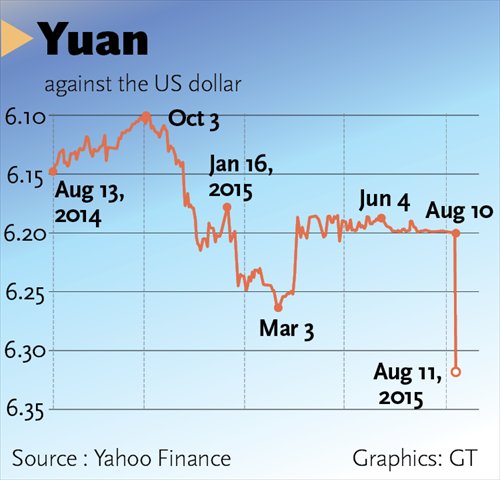China devalues yuan by 2%
PBC liberalizes currency rate based on market forces

A man walks past a Chinese yuan currency sign in Hong Kong on Tuesday. China's central bank cuts the reference rate for its yuan against the US dollar by almost 2 percent, as it seeks to bolster flagging economic growth. Photo: AFP

Graphics: GT
The People's Bank of China (PBC) surprisingly devalued the Chinese yuan by nearly 2 percent against the US dollar on Tuesday, a "one-time fix" which resulted from the new way of calculating the central parity rate, or the difference between the spot and forward exchange rates.
The PBC said in a statement on its official website that starting from Tuesday, the central bank will begin to set the yuan's central parity rate against the greenback based on market-based quotes and the previous trading day's closing level to better reflect market forces.
"The yuan's central parity rate has deviated quite a lot recently from the market rate and has lasted quite a long time, undermining its market benchmark status and authority," a PBC spokesman said in another statement on Tuesday.
As a result, the central bank adjusted the yuan's central parity rate at close to 6.23 per dollar on Tuesday, depreciating by 1,136 basis points compared with Monday's rate, representing the biggest one-day drop in a decade.
The central parity rate is an official guide rate set by the PBC, which decides the daily fluctuation range of the spot yuan as the central bank allows the yuan to move 2 percent on either side from the official level in the spot market.
The yuan's spot exchange rate fell to 6.32 versus the dollar on Tuesday, dropping from 6.21 at the close on Monday.
Experts generally believe the move is mainly aimed at boosting the country's exports and the economy as a whole.
"The yuan's sudden devaluation may have something to do with the poor trade data released over the weekend," Tan Yaling, head of the China Forex Investment Research Institute, told the Global Times on Tuesday. "With this move, the central bank intends to prop up the economy as a weakening currency typically helps improve exports."
China's exports in July slumped 8.3 percent from the same period last year to $195.1 billion, according to data released on Saturday by the General Administration of Customs.
US dollar pressure
As the US economy recovers, the Federal Reserve is expected to increase interest rates by the end of the year, leading to a stronger dollar, weaker euro and yen as well as considerable depreciation in the currencies of some emerging-market and commodity-producing economies, according to the PBC spokesman.
"While some emerging-market economies allowed their currencies to depreciate against the dollar, the yuan was still pegged to the greenback for the purpose of exchange rate stability, which led to relative appreciation against various currencies and put pressure on its exports," Zhou Yu, director of the Research Center of International Finance at the Shanghai Academy of Social Sciences, told the Global Times on Tuesday. "The devaluation was necessary to ensure the stability of the currency's real effective rate in the context of the strengthening dollar."
Zhou also said that the central bank has been seeking to widen the range and elasticity of China's exchange rate mechanism, and it seems a good time for the PBC to act.
"Since inflation has been relatively low in recent months, a moderate devaluation won't cause much inflationary pressure for now," he explained.
According to Zhu Zhenxin, a research fellow at the Research Institute of Minsheng Securities, China's yuan has been facing great devaluation pressure, and the PBC move could mean that the regulator will likely continue its free-market push to allow the currency's exchange to float more freely.
Conducive to SDR entry
Some economists are linking the central bank's move to China's bid to get the yuan included in the Special Drawing Rights (SDR), international reserve currencies used by the International Monetary Fund (IMF).
Wang Tao, chief China economist at UBS AG, told the Global Times on Tuesday that the devaluation is also intended to "improve the 'market-driven' quality of the PBC fix so that it can be included in the SDR." She said the yuan is not likely to slide dramatically, as the PBC will remain cautious in managing the currency.
The IMF will review whether to include the yuan in the SDR later this year. An IMF staff report last week proposed to retain the current SDR composition until September 2016.
As for currency reform, the central bank said it will seek to let the market play a greater role in deciding the exchange rate, introducing qualified overseas entities to the foreign exchange market and eventually uniting onshore and offshore yuan exchange rate.
Equity markets hit
Stocks tumbled in Asia, Europe and the Americas after the devaluation of the yuan. The MSCI All World Index of global shares fell 0.7 percent, Reuters reported. The devaluation especially hit the stock prices of companies exposed to China, with shares of US heavy equipment maker Caterpillar losing 2.3 percent and Germany's Volkswagen dropping 4.6 percent, the report said.